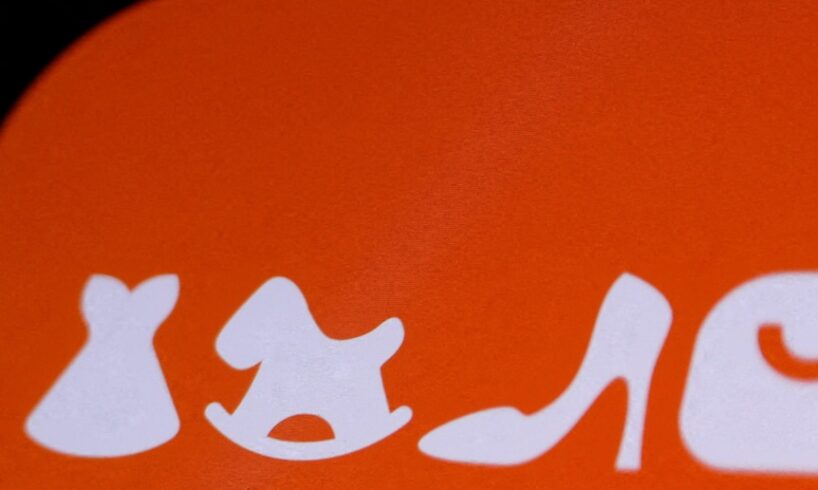
Online shopping platforms based overseas are spending millions of extra dollars on advertising in Australia as they seek to expand their presence outside the US, following the introduction of President Donald Trump’s heavy new import tariffs.
The change in marketing strategy has caused fears that a new deluge of unsafe products will flood into Australia.
Hannah Jacobs-Herd’s nine-year-old daughter Daniella sustained severe burns in July last year, after a hoodie purchased on Temu, a Chinese e-commerce company that ships goods directly to buyers from third-party sellers, caught alight.
Daniella received severe burns to 13 per cent of her body, including her face, after sparks from a fire pit hit the hoodie and it immediately went up in flames.
Daniella Jacobs-Herd underwent eight weeks of skin graft operations. (Supplied: Hannah Jacobs-Herd)
Ms Jacobs-Herd said after the trauma suffered by her daughter, it was distressing to see a deluge of Temu advertising pop up when she played free games on her tablet computer.
“She [Daniella] cannot escape Temu. We cannot escape Temu. It is just everywhere,” she said.
Ms Jacobs-Herd said she braced for more advertising from the platform when she heard about Mr Trump’s “Liberation Day” tariffs targeting China.
“I lost it because I knew that we were going to get bombarded,” she said.
Trump call drives Temu to Australia
In April this year, Mr Trump signed an executive order restoring an import charge for Chinese goods valued at or under $US800 ($1,224).
The move doubled the cost of goods bought through Temu by American consumers, driving the company away from the US to more favourable markets, including Europe and Australia.
Donald Trump removed an import fee exemption for low-cost China goods in April. (Reuters: Kevin Lamarque)
Goods worth less than $1,000 can generally be imported into Australia free of duties, taxes or charges, meaning retailers do not need to absorb import fees or pass them on to Australian consumers.
Sharing data exclusively with the ABC, US market intelligence firm Sensor Tower said Temu had more than doubled its monthly Australian advertising spend from April to June 2025, compared with March.
Since Temu’s 110 per cent increase in advertising spend, the platform’s monthly users have increased by 50 per cent for the June quarter.
Shein, another Chinese marketplace app, increased its monthly Australian advertising spend by 160 per cent, for a 15 per cent increase in monthly users.
Market analysts say Temu has more than doubled its monthly Australian advertising spend. (Reuters: Florence Lo)
Sensor Tower estimated Temu spent more than $4 million on Australian advertising in January alone, primarily through Facebook and Instagram.
Taylor Brydges, a research principal at the University of Technology Sydney’s Institute for Sustainable Futures, said the Sensor Tower data was representative of Temu’s shift away from the US.
“Temu is looking to … the kind of places where shipping is still low cost and … crucially, where consumers are still quite price sensitive due to cost-of-living pressures,” Dr Brydges said.
Temu did not directly respond to questions from the ABC about its increased advertising spend in Australia.
A spokesperson said the company opened the platform to Australian suppliers in March this year to better support them to cater for the local market.
Hannah Jacobs-Herd wants stronger consumer protection laws in place. (ABC Wide Bay: James C Taylor)
Daniella’s mother said she was worried more Temu customers would be harmed because of Australia’s weak consumer protection laws.
“There should be more enforcement around it,” Ms Jacobs-Herd said.
It is a sentiment echoed by consumer protection advocates.
General safety provision
The Australian Competition and Consumer Commission (ACCC) recently released a report on its five-year inquiry into digital platforms.
The report found Temu had rapidly become Australia’s most-used retail marketplace app since launching in the country in March 2023.
Temu has become Australia’s most-used retail marketplace app. (Supplied: Australian Competition and Consumer Commission)
It noted that, unlike Australia, regions including the European Union, Canada and the US had responded to the growing popularity of online retail platforms like Temu by prohibiting the sale of unsafe goods.
Consumer advocacy group Choice has been calling for a similar general safety provision since 2020.
Choice deputy director of campaigns Andy Kelly said recent research by the group showed 74 per cent of consumers mistakenly believed businesses were legally required to ensure products were safe before selling them in Australia.
“A general safety provision is long overdue. We know consumers have a false sense of security when it comes to product safety in Australia,” he said.
In a statement, Assistant Minister for Competition, Charities and Treasury Andrew Leigh said the government was considering the findings of the ACCC’s report, including the recommendation for a proactive general safety provision.
“No business should gain a competitive advantage by compromising on safety. Australian consumers deserve to know that online marketplaces value their safety and have taken steps to ensure their products are safe to use,” he said.
Andrew Leigh says the government is considering the findings of the ACCC report. (ABC News: Ian Cutmore)
In the meantime, Ms Jacobs-Herd said she worried other families would suffer harm after seeking a bargain.
“We’re just pretty much like any person who want to buy their child an Oodie but they can’t afford it, so they find a knock-off — lots of people do that,” she said.
“If I go online and buy the same thing for a cheaper price, I’ve got to question if my kid’s going to die from this product.”
Will Temu and Shein change the way we shop online forever?
Four months after Daniella was burned, Temu issued a voluntary recall notice for the hoodie in consultation with the ACCC.
Ms Jacobs-Herd, who lives three hours north of Brisbane in Hervey Bay, is currently engaged in a lawsuit with Temu over the incident.
A Temu spokesperson told the ABC the company had banned the merchant involved from selling “children-related products” on its platform globally.
The spokesperson said as a third-party marketplace, Temu required all merchants to fully comply with local laws and standards.
“We have in place a quality assurance system that includes vetting sellers and product listings, physical spot checks … monitoring using technology and human reviewers, and swift enforcement action,” they said.
“We are also in discussions with the ACCC about becoming a signatory to the Online Product Safety Pledge.”





